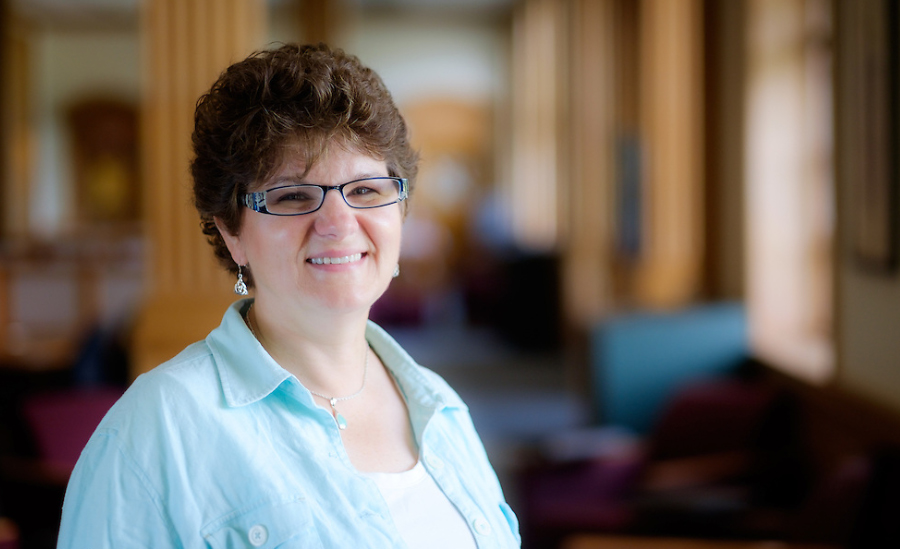
January is National Mentoring Month. In recognition, the Mentoring Committee wanted to highlight the great work our ZSR colleagues are engaged in. We believe this is a great way to illuminate the various opportunities that are available for library staff.
This week we are featuring Mary Beth Lock, ZSR’s Associate Dean. Mary Beth is currently involved with two unique writing projects, and also serving on ACRL’s New Roles and Changing Landscapes committee on its “Retention” subcommittee.
We’ll begin with an intro by Mary Beth, followed by a Q&A with her.
One of the things that is most “hidden” about being an academic librarian (especially to those outside of it) is the expectation that you will share your expertise with the rest of the profession. The method one chooses to share your talent to further librarianship is pretty much up to the individual librarian, and finding ways to have an impact can be daunting. But the three methods most usually employed are these: presentation, publication, and committee service.
Presentation is perhaps the most immediately impactful, in my estimation, and it can certainly get a lot of buzz going when you have a successful presentation at a conference. But doing a presentation requires having the gumption to get up in front of an audience and share new ideas…something that might be beyond the limits of comfort for an introvert. Not to mention that the limited number of slots for presentation at conferences makes one realize that, even if you have a great new service or idea and are willing to share it, it isn’t up to you whether your presentation will be accepted (I’m looking at you ACRL). One has to develop a different skill set to make your presentation proposal both brief enough and interesting enough to be accepted. Seeking help from a mentor or colleague who has done it before can provide reassurance in an unfamiliar process.
Publication is the second option and has the benefit of being pretty much under the control of the individual librarian who has the will and discipline to set aside the time to evaluate research or write about a new groundbreaking service. Once you’ve got your thoughts down on paper, one just needs to shop around the article or chapter until one finds a place of publication that will publish it. Finding time to write or a place to publish has its own challenges, and a mentor can help with that.
The third way to participate in furthering the profession is through committee service. Committee work through professional organizations allows one to be impactful in ways greater than the individual. A librarian can influence the future direction of librarianship by helping steer the professional organization and assist in elevating its work (You also get to know librarians from across the nation with similar passions to your own, which actually helps in both future presentations and publications as you build your network). Sometimes mentors are needed to provide a path to membership since committee assignments are prized, and the appointment process is competitive.
As a librarian, I’ve had the opportunity to do all three of these, and in every case, utilizing a mentor was extremely useful.
How did you become involved in both of these endeavors/commitments?
I am currently writing a chapter and an article (with Summer and Elizabeth) on our experience with the changes we implemented to interviewing practices as a result of the changes we made due to COVID and to address issues to increase equity and inclusion in the process. The idea for the article grew out of a survey we conducted for academic librarians who were recently hired, to seek out input from them on what worked and what didn’t in their interview experiences during the height of the pandemic. We wanted to continue to evaluate our changed interview practices in order to make them as comfortable as possible for the applicant. Once we had the data, we started to write the article, and simultaneously generated a list of likely publications that might be interested in publishing it, and reached out to one that said they would be interested in our research. Then we had the guidelines of the publication to help determine what we should include in the write up, the length they expected, the citation style required, etc. All of that is exceedingly helpful as one muscles through a data set.
The book chapter came about when I saw a call for a forthcoming publication that came across the ACRL listserv. Since the topic of the book chapter was tangential but related to our research, we put in a proposal to have a chapter included and were accepted for that as well. Pro tip: if you can use one publication idea to write two publications…do it!
I am also serving on the ACRL New Roles and Changing Landscapes committee on the “Retention” subcommittee, which is developing a libguide to monitor practices that will increase retention, especially with regards to those employees who are in marginalized communities. My collaboration with this committee came about as a direct result of working with the New Roles and Changing Landscapes committee when I was chair of the ACRL Equity, Diversity and Inclusion committee. Once you get put on a committee, there are many opportunities for you to continue to serve. The biggest challenge is getting that first committee assignment.
Could you share what you have learned most from your research on these writing projects and as a member of this committee?
For the writing projects, I’ve learned quite a bit about the subject matter, and ALSO quite a bit about the writing and publishing process. Evaluating data will help you uncover really interesting conclusions and provide many a-ha! moments, but it always takes more time than you anticipate. Shopping around an article idea takes a bit of courage, but journal editors are helpful and not judgmental. The writing process itself really takes a lot of time, especially when you are writing with collaborators. But the end result, when working with engaged and inspiring colleagues, makes the effort worth it, and the product even stronger (thanks to all my current and former collaborators)!
My work on committees really makes me recognize how the sky’s the limit for your level of engagement. If you have a good idea, committee members are ready to engage to help you bring it to fruition. Committee members happily follow an enthusiastic leader who brings forth a new idea. I’ve been both the initiator of ideas to implement on committees, and also one who ably assists in implementing someone else’s charge. It is really rewarding work, and a great way to meet colleagues from across the profession who have interests similar to yours.
Has previous library mentorship prepared you for either of these experiences? How so?
I honestly wouldn’t have had a clue how to move forward in any of these areas without the guidance of a mentor. Susan Smith was my mentor for my first publication. Lauren Corbett was my mentor for finding a Committee assignment. The first presentations I’ve done were all collaborations with others in the library! I utilized many mentors!
Would you suggest a mentor to someone looking to do similar work? Why so?
Always. It is invaluable. And mentors are useful for being the first place to bounce an idea off of, asking the questions that you are uncomfortable asking anywhere else, getting tools and guidance for how to proceed.
If you were to informally mentor someone looking to do similar work, what would your advice be?
Let’s get started. What are your ideas for publication? Let’s look at committees whose work interests you! What ideas have you got for a presentation? Let’s look at possibilities together!



1 Comment on ‘What We’re Working On: Mary Beth Lock’
Thank you for sharing! I’m looking forward to reading your article & book chapter.